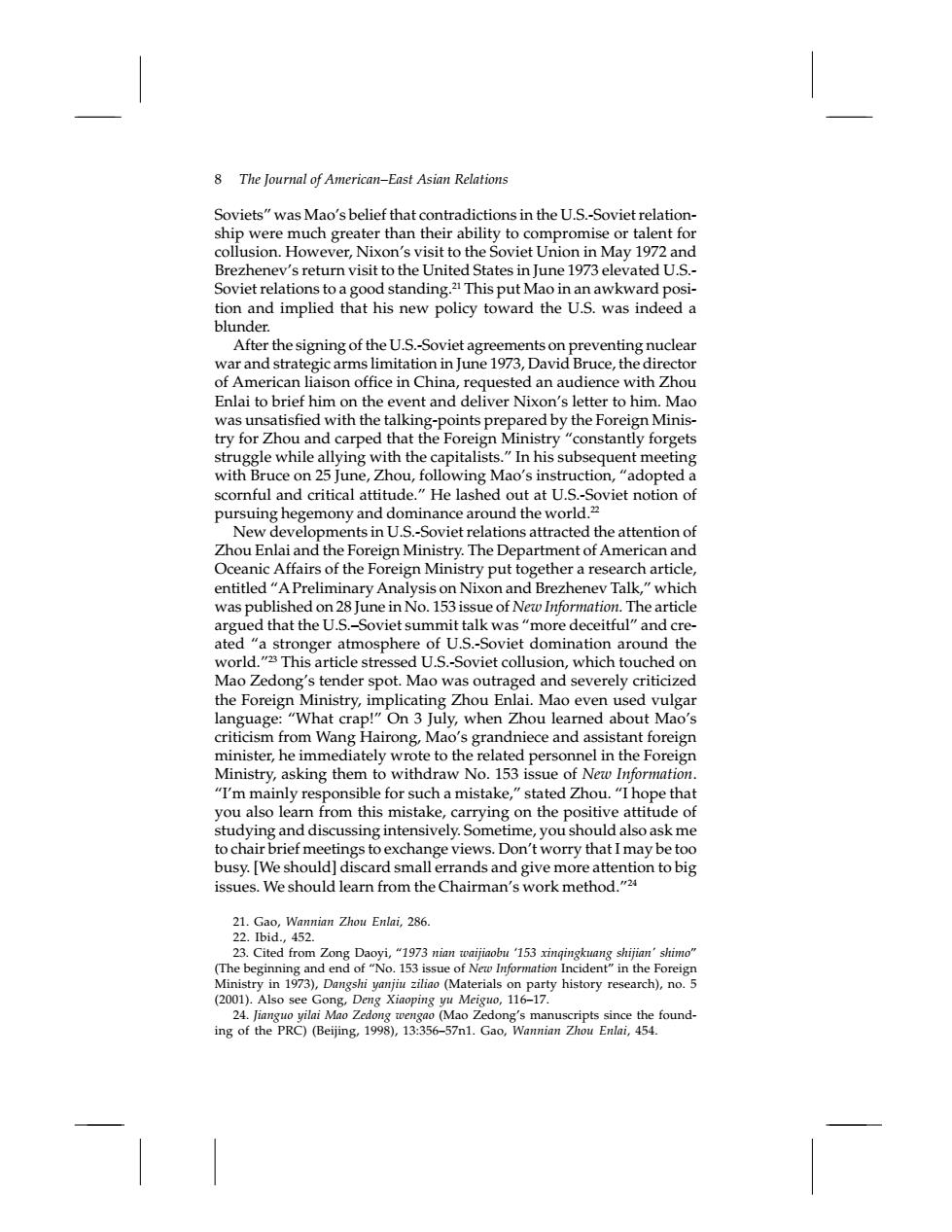正在加载图片...

8 The Journal of American-East Asian Relations Soviets"was Mao's belief that contradictions in the U.S.-Soviet relation- ship were much greater than their ability to compromise or talent for collusion.However,Nixon's visit to the Soviet Union in May 1972 and Brezhenev's return visit to the United States in June 1973 elevated U.S.- Soviet relations to a good standing.21 This put Mao in an awkward posi- tion and implied that his new policy toward the U.S.was indeed a blunder. After the signing of the U.S.-Soviet agreements on preventing nuclear war and strategic arms limitation in June 1973,David Bruce,the director of American liaison office in China,requested an audience with Zhou Enlai to brief him on the event and deliver Nixon's letter to him.Mao was unsatisfied with the talking-points prepared by the Foreign Minis- try for Zhou and carped that the Foreign Ministry "constantly forgets struggle while allying with the capitalists."In his subsequent meeting with Bruce on 25 June,Zhou,following Mao's instruction,"adopted a scornful and critical attitude.He lashed out at U.S.-Soviet notion of pursuing hegemony and dominance around the world.2 New developments in U.S.-Soviet relations attracted the attention of Zhou Enlai and the Foreign Ministry.The Department of American and Oceanic Affairs of the Foreign Ministry put together a research article, entitled"A Preliminary Analysis on Nixon and Brezhenev Talk,"which was published on 28 June in No.153 issue of New Information.The article argued that the U.S.-Soviet summit talk was"more deceitful"and cre- ated "a stronger atmosphere of U.S.-Soviet domination around the world."2 This article stressed U.S.-Soviet collusion,which touched on Mao Zedong's tender spot.Mao was outraged and severely criticized the Foreign Ministry,implicating Zhou Enlai.Mao even used vulgar language:"What crap!"On 3 July,when Zhou learned about Mao's criticism from Wang Hairong,Mao's grandniece and assistant foreign minister,he immediately wrote to the related personnel in the Foreign Ministry,asking them to withdraw No.153 issue of New Information. "I'm mainly responsible for such a mistake,"stated Zhou."I hope that you also learn from this mistake,carrying on the positive attitude of studying and discussing intensively.Sometime,you should also ask me to chair brief meetings to exchange views.Don't worry that I may be too busy.[We should]discard small errands and give more attention to big issues.We should learn from the Chairman's work method."24 21.Gao,Wannian Zhou Enlai,286 22.Ibid.,452. 23.Cited from Zong Daoyi,"1973 nian waijiaobu 153 xinqingkuang shijian'shimo" (The beginning and end of"No.153 issue of New Information Incident"in the Foreign Ministry in 1973),Dangshi yanjiu ziliao(Materials on party history research),no.5 (2001).Also see Gong,Deng Xiaoping yu Meiguo,116-17 24.Jianguo yilai Mao Zedong wengao (Mao Zedong's manuscripts since the found- ing of the PRC)(Beijing,1998),13:356-57n1.Gao,Wannian Zhou Enlai,454.8 The Journal of American–East Asian Relations Soviets” was Mao’s belief that contradictions in the U.S.-Soviet relationship were much greater than their ability to compromise or talent for collusion. However, Nixon’s visit to the Soviet Union in May 1972 and Brezhenev’s return visit to the United States in June 1973 elevated U.S.- Soviet relations to a good standing.21 This put Mao in an awkward position and implied that his new policy toward the U.S. was indeed a blunder. After the signing of the U.S.-Soviet agreements on preventing nuclear war and strategic arms limitation in June 1973, David Bruce, the director of American liaison office in China, requested an audience with Zhou Enlai to brief him on the event and deliver Nixon’s letter to him. Mao was unsatisfied with the talking-points prepared by the Foreign Ministry for Zhou and carped that the Foreign Ministry “constantly forgets struggle while allying with the capitalists.” In his subsequent meeting with Bruce on 25 June, Zhou, following Mao’s instruction, “adopted a scornful and critical attitude.” He lashed out at U.S.-Soviet notion of pursuing hegemony and dominance around the world.22 New developments in U.S.-Soviet relations attracted the attention of Zhou Enlai and the Foreign Ministry. The Department of American and Oceanic Affairs of the Foreign Ministry put together a research article, entitled “A Preliminary Analysis on Nixon and Brezhenev Talk,” which was published on 28 June in No. 153 issue of New Information. The article argued that the U.S.–Soviet summit talk was “more deceitful” and created “a stronger atmosphere of U.S.-Soviet domination around the world.”23 This article stressed U.S.-Soviet collusion, which touched on Mao Zedong’s tender spot. Mao was outraged and severely criticized the Foreign Ministry, implicating Zhou Enlai. Mao even used vulgar language: “What crap!” On 3 July, when Zhou learned about Mao’s criticism from Wang Hairong, Mao’s grandniece and assistant foreign minister, he immediately wrote to the related personnel in the Foreign Ministry, asking them to withdraw No. 153 issue of New Information. “I’m mainly responsible for such a mistake,” stated Zhou. “I hope that you also learn from this mistake, carrying on the positive attitude of studying and discussing intensively. Sometime, you should also ask me to chair brief meetings to exchange views. Don’t worry that I may be too busy. [We should] discard small errands and give more attention to big issues. We should learn from the Chairman’s work method.”24 21. Gao, Wannian Zhou Enlai, 286. 22. Ibid., 452. 23. Cited from Zong Daoyi, “1973 nian waijiaobu ‘153 xinqingkuang shijian' shimo” (The beginning and end of “No. 153 issue of New Information Incident” in the Foreign Ministry in 1973), Dangshi yanjiu ziliao (Materials on party history research), no. 5 (2001). Also see Gong, Deng Xiaoping yu Meiguo, 116–17. 24. Jianguo yilai Mao Zedong wengao (Mao Zedong’s manuscripts since the founding of the PRC) (Beijing, 1998), 13:356–57n1. Gao, Wannian Zhou Enlai, 454